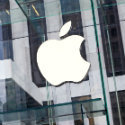iPhone apathy bites Apple
Smartphone giant suffers a double-digit percentage fall in profit amid weak demand for the latest devices.

"iPhones, iPhones, get your discount smartphones here today." Apple CEO Tim Cook has adopted the tactics of a London street market trader flogging cut-price fruit and veg as he tries to shift Apple gadgets that have been moldering in the crate.
While some analysts are optimistic about a hardware recovery, iPhone apathy took a huge bite out of Apple's earnings for the first three months of the calendar year (Apple's fiscal second quarter). Revenues fell 5%, to around $58 billion, compared with the year-earlier period, and net income sank 16%, to $11.6 billion. Price cuts and trade-ins form part of Cook's response.
Apple's share price is up 5% in pre-market trading on the Nasdaq. The decision to raise dividends will have helped, but the increase also suggests investors are pleased with the uncharacteristic pricing moves by a firm whose followers have generally paid whatever exorbitant fees it has charged. That all changed in the fiscal first quarter, when Apple generated $9 billion less in revenues from iPhone sales than a year earlier. Executives blamed a slowdown in China amid strong competition from domestic rivals like Huawei. The real issue, as others saw it, was a lengthening of replacement cycles: Unimpressed with the latest gadget updates, customers are sticking with their current models. iPhone revenues in the second quarter fell 17%, to $31 billion.
Cook's discounts and promotions have already had some impact, though. Activity picked up in China in the last few weeks of the quarter, he said. Timothy O'Shea, an equity analyst with Jefferies, raised his targets for the company based on a "sooner than expected hardware recovery."
But O'Shea remains worried about the long-term smartphone outlook. "These data points are all positives for Apple, but they also do little to address the question of the iPhone's competitive positioning against the like of Huawei, Oppo and Vivo, who have been net share gainers," he said in a research note issued today.
Conscious of its dependence on the iPhone, which accounted for about 54% of revenues in the second quarter, Apple has turned to its services business for sales growth. The move looks wise. No other hardware product has taken off like the iPhone, and services promise a gushing stream of repeat monthly revenues.
You're invited to attend Light Reading's Big 5G Event! Formerly the Big Communications Event and 5G North America, Big 5G is where telecom's brightest minds deliver the critical insight needed to piece together the 5G puzzle. We'll see you May 6-8 in Denver -- communications service providers get in free!
Those were up 16% in the second quarter, to around $11.5 billion, beating analyst expectations. The great unknown is whether services can succeed hardware as the engine of sales growth. Much depends on the company's recently announced push into the market for TV and video content. But some analysts have been underwhelmed, regarding Apple's new service offering as an imitator of Netflix or Amazon Prime rather than a real innovation.
Apple won't care if consumers come running. "The question that remains to be answered is how large and how soon the impact will be from the newly announced services in March," said O'Shea in his research note.
But the company will have to exercise caution as it builds the services business. It has been dismantling the walls that separate its software from non-Apple gadgets, allowing customers to watch Apple content on TVs made by Samsung, for instance. As those walls come down, there is a risk the whole edifice loses some of its shine, making Apple look more like any other gadget or software company. That would make those high iPhone prices even harder to justify.
Related posts:
— Iain Morris, International Editor, Light Reading
Read more about:
AsiaAbout the Author(s)
You May Also Like




_International_Software_Products.jpeg?width=300&auto=webp&quality=80&disable=upscale)







